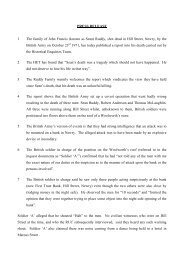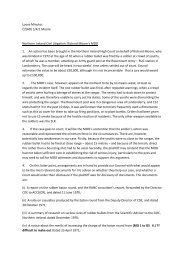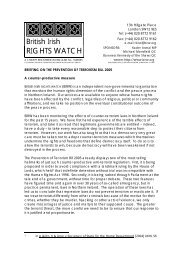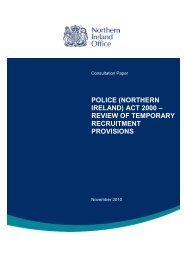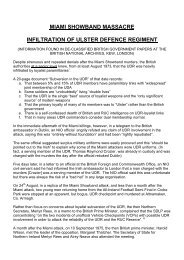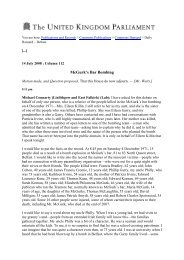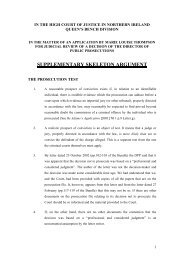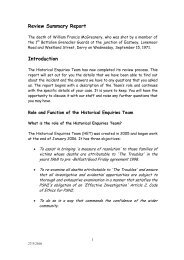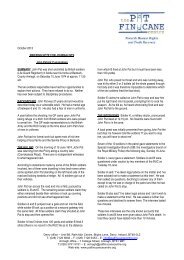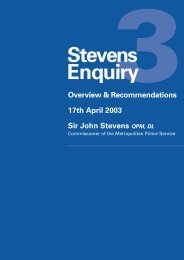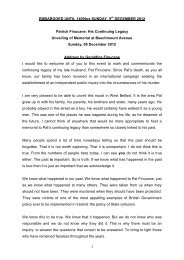Patrick Shanaghan v the United Kingdom - The Pat Finucane Centre
Patrick Shanaghan v the United Kingdom - The Pat Finucane Centre
Patrick Shanaghan v the United Kingdom - The Pat Finucane Centre
You also want an ePaper? Increase the reach of your titles
YUMPU automatically turns print PDFs into web optimized ePapers that Google loves.
18 SHANAGHAN v. THE UNITED KINGDOM JUDGMENT<br />
III. RELEVANT INTERNATIONAL LAW AND PRACTICE<br />
A. <strong>The</strong> <strong>United</strong> Nations<br />
69. <strong>The</strong> <strong>United</strong> Nations Basic Principles on <strong>the</strong> Use of Force and<br />
Firearms by Law Enforcement Officials (UN Force and Firearms Principles)<br />
were adopted on 7 September 1990 by <strong>the</strong> Eighth <strong>United</strong> Nations Congress<br />
on <strong>the</strong> Prevention of Crime and <strong>the</strong> Treatment of Offenders.<br />
70. Paragraph 9 of <strong>the</strong> UN Force and Firearms Principles provides, inter<br />
alia, that <strong>the</strong> “intentional lethal use of firearms may only be made when<br />
strictly unavoidable in order to protect life”.<br />
71. O<strong>the</strong>r relevant provisions read as follows:<br />
Paragraph 10<br />
“... law enforcement officials shall identify <strong>the</strong>mselves as such and shall give a clear<br />
warning of <strong>the</strong>ir intent to use firearms, with sufficient time for <strong>the</strong> warnings to be<br />
observed, unless to do so would unduly place <strong>the</strong> law enforcement officials at risk or<br />
would create a risk of death or serious harm to o<strong>the</strong>r persons, or would be clearly<br />
inappropriate or pointless in <strong>the</strong> circumstances of <strong>the</strong> incident.”<br />
Paragraph 22<br />
“... Governments and law enforcement agencies shall ensure that an effective review<br />
process is available and that independent administrative or prosecutorial authorities<br />
are in a position to exercise jurisdiction in appropriate circumstances. In cases of death<br />
and serious injury or o<strong>the</strong>r grave consequences, a detailed report shall be sent<br />
promptly to <strong>the</strong> competent authorities responsible for administrative review and<br />
judicial control.”<br />
Paragraph 23<br />
“Persons affected by <strong>the</strong> use of force and firearms or <strong>the</strong>ir legal representatives shall<br />
have access to an independent process, including a judicial process. In <strong>the</strong> event of<br />
<strong>the</strong> death of such persons, this provision shall apply to <strong>the</strong>ir dependants accordingly.”<br />
72. Paragraph 9 of <strong>the</strong> <strong>United</strong> Nations Principles on <strong>the</strong> Effective<br />
Prevention and Investigation of Extra-Legal, Arbitrary and Summary<br />
Executions, adopted on 24 May 1989 by <strong>the</strong> Economic and Social Council<br />
Resolution 1989/65, (UN Principles on Extra-Legal Executions) provides,<br />
inter alia, that:<br />
“<strong>The</strong>re shall be a thorough, prompt and impartial investigation of all suspected cases<br />
of extra legal, arbitrary and summary executions, including cases where complaints by<br />
relatives or o<strong>the</strong>r reliable reports suggest unnatural death in <strong>the</strong> above circumstances<br />
...”<br />
73. Paragraphs 10 to 17 of <strong>the</strong> UN Principles on Extra-Legal Executions<br />
contain a series of detailed requirements that should be observed by<br />
investigative procedures into such deaths.<br />
Paragraph 10 states, inter alia:



